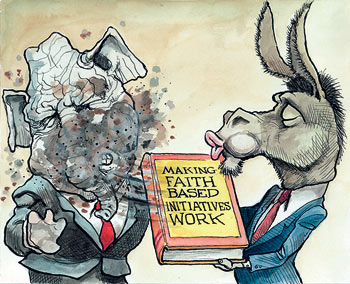There is a great exchange in Christianity Today about the so-called “red letter Christians” and their political and cultural positioning.
Writer Stan Guthrie argues:
…while Christians should not be beholden to any political party, our politics must be informed by our faith. Unfortunately, the platform of Red-Letter Christians always seems to come out of the wash blue, just as some other “nonpartisan” Christian groups consistently align with the Republicans.
If you believe ending poverty requires more government spending and a higher minimum wage; if you believe in a manmade global warming crisis; if you oppose school vouchers; if homosexual marriage is no big deal (and in fact a civil right); and if you are tired of talking about the 50 million unborn human beings lost to abortion since 1973, then you know which lever to pull.
How we vote as Christians may differ, and that’s okay. But let’s not insist that we are somehow above the political fray. That is just the kind of sophistry the Lord warned against.
In response, Tony Campolo writes:
You got us RLCs right again when you suggested we were anti-war, pro-environment, and deeply committed to ending poverty primarily because we believe Jesus is anti-war, pro-environment, and deeply committed to ending poverty. The only mistake you made was to imply that thinking this way—or trying to influence our government according to these values—makes us the Religious Left:
That you think asking questions such as, “Do the candidates’ budget and tax policies reward the rich or show compassion for poor families?,” or “Do the candidates’ policies protect the creation or serve corporate interests that damage it?,” is partisan saddens us. We believe these are the questions that every Christian should be asking, no matter which political party or candidate has the better answers at a given time in history.
This is a hint of a much larger debate that will be occurring during the next year between the so-called religious right and the so-called religious left. It will be a debate about theology, about politics, about culture, and about the nature of Jesus. It is a good debate to be having. I just hope it is a debate defined in no small part by its humility.

